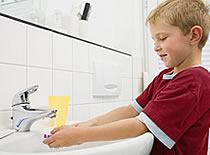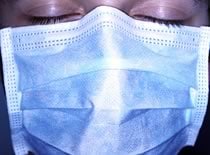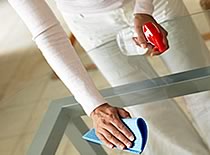When providing care to a household member who is sick with influenza, the most important ways to protect yourself and others who are not sick are to:
 keep the sick person away from other people as much as possible (see “placement of the sick person”) especially others who are at high risk for complications from influenza
keep the sick person away from other people as much as possible (see “placement of the sick person”) especially others who are at high risk for complications from influenza- remind the sick person to cover their coughs, and clean their hands with soap and water often. If soap and water are not available, they should use an alcohol-based hand rub*, especially after coughing and/or sneezing
- have everyone in the household clean their hands often, using soap and water (or an alcohol-based hand rub*, if soap and water are not available). Children may need reminders or help keeping their hands clean
- ask your health care provider if household contacts of the sick person—particularly those contacts who may be pregnant or have chronic health conditions—should take antiviral medications such as oseltamivir (Tamiflu®) or zanamivir (Relenza®) to prevent the flu
- If you are in a high risk group for complications from influenza, you should attempt to avoid close contact (within 6 feet) with household members who are sick with influenza. If close contact with a sick individual is unavoidable, consider wearing a facemask or respirator, if available and tolerable. Infants should not be cared for by sick family members. For more information, see the Interim Recommendations for Facemask and Respirator Use
Placement of the sick person
- Keep the sick person in a room separate from the common areas of the house. (For example, a spare bedroom with its own bathroom, if that’s possible.) Keep the sickroom door closed.
- Unless necessary for medical care or other necessities, people who are sick with an influenza-like-illness should stay home and keep away from others as much as possible, including avoiding travel, for at least 24 hours after fever is gone except to get medical care or for other necessities. (Fever should be gone without the use of a fever-reducing medicine). This is to keep from making others sick. Children, especially younger children, might potentially be contagious for longer periods.
- If persons with the flu need to leave the home (for example, for medical care), they should wear a facemask, if available and tolerable, and cover their nose and mouth when coughing or sneezing
- Have the sick person wear a facemask – if available and tolerable – if they need to be in a common area of the house near other persons.
- If possible, sick persons should use a separate bathroom. This bathroom should be cleaned daily with household disinfectant (see below).
Protect other persons in the home
- The sick person should not have visitors other than caregivers. A phone call is safer than a visit.
- If possible, have only one adult in the home take care of the sick person. People at increased risk of severe illness from flu should not be the designated caretaker, if possible.
- If you are in a high risk group for complications from influenza, you should attempt to avoid close contact (within 6 feet) with household members who are sick with influenza. If close contact with a sick individual is unavoidable, consider wearing a facemask or respirator, if available and tolerable. For more information, see the Interim Recommendations for Facemask and Respirator Use.
- Avoid having pregnant women care for the sick person. (Pregnant women are at increased risk of influenza-related complications and immunity can be suppressed during pregnancy).
- Avoid having sick family members care for infants and other groups at high risk for complications of influenza.
- All persons in the household should clean their hands with soap and water frequently, including after every contact with the sick person or the person’s room or bathroom.
- Use paper towels for drying hands after hand washing or dedicate cloth towels to each person in the household. For example, have different colored towels for each person.
- If soap and water are not available, persons should use an alcohol-based hand rub.*
- If possible, consideration should be given to maintaining good ventilation in shared household areas (e.g., keeping windows open in restrooms, kitchen, bathroom, etc.).
- Antiviral medications can be used to prevent the flu, so check with your health care provider to see if some persons in the home should use antiviral medications.
If you are the caregiver
- Avoid being face-to-face with the sick person.
- When holding small children who are sick, place their chin on your shoulder so that they will not cough in your face.
- Clean your hands with soap and water after you touch the sick person or handle used tissues, or laundry. If soap and water are not available, use an alcohol-based hand rub*
- Talk to your health care provider about taking antiviral medication to prevent the caregiver from getting the flu.
- If you are at high risk of influenza associated complications, you should not be the designated caretaker, if possible.
- If you are in a high risk group for complications from influenza, you should attempt to avoid close contact (within 6 feet) with household members who are sick with influenza. Designate a person who is not at high risk of flu associated complications as the primary caretaker of household members who are sick with influenza, if at all possible. If close contact with a sick individual is unavoidable, consider wearing a facemask or respirator, if available and tolerable. For more information, see the Interim Recommendations for Facemask and Respirator Use
- Monitor yourself and household members for flu symptoms and contact a telephone hotline or health care provider if symptoms occur.
Using Facemasks or Respirators
 Avoid close contact (less than about 6 feet away) with the sick person as much as possible.
Avoid close contact (less than about 6 feet away) with the sick person as much as possible.- If you must have close contact with the sick person (for example, hold a sick infant), spend the least amount of time possible in close contact and try to wear a facemask (for example, surgical mask) or N95 disposable respirator.
- An N95 respirator that fits snugly on your face can filter out small particles that can be inhaled around the edges of a facemask, but compared with a facemask it is harder to breathe through an N95 mask for long periods of time. More information on facemasks and respirators can be found at H1N1 Flu (Swine Flu) website.
- Facemasks and respirators may be purchased at a pharmacy, building supply or hardware store.
- Wear an N95 respirator if you help a sick person with respiratory treatments using a nebulizer or inhaler, as directed by their doctor. Respiratory treatments should be performed in a separate room away from common areas of the house when at all possible.
- Used facemasks and N95 respirators should be taken off and placed immediately in the regular trash so they don’t touch anything else.
- Avoid re-using disposable facemasks and N95 respirators, if possible. If a reusable fabric facemask is used, it should be laundered with normal laundry detergent and tumble-dried in a hot dryer.
- After you take off a facemask or N95 respirator, clean your hands with soap and water or an alcohol-based hand sanitizer.
- For more information, see the Interim Recommendations for Facemask and Respirator Use
Household Cleaning, Laundry, and Waste Disposal
 Throw away tissues and other disposable items used by the sick person in the trash. Wash your hands after touching used tissues and similar waste.
Throw away tissues and other disposable items used by the sick person in the trash. Wash your hands after touching used tissues and similar waste. - Keep surfaces (especially bedside tables, surfaces in the bathroom, and toys for children) clean by wiping them down with a household disinfectant according to directions on the product label.
- Linens, eating utensils, and dishes belonging to those who are sick do not need to be cleaned separately, but importantly these items should not be shared without washing thoroughly first.
- • Wash linens (such as bed sheets and towels) by using household laundry soap and tumble dry on a hot setting. Avoid “hugging” laundry prior to washing it to prevent contaminating yourself. Clean your hands with soap and water right after handling dirty laundry. If soap and water are not available, use an alcohol-based hand rub.*
- Eating utensils should be washed either in a dishwasher or by hand with water and soap.
